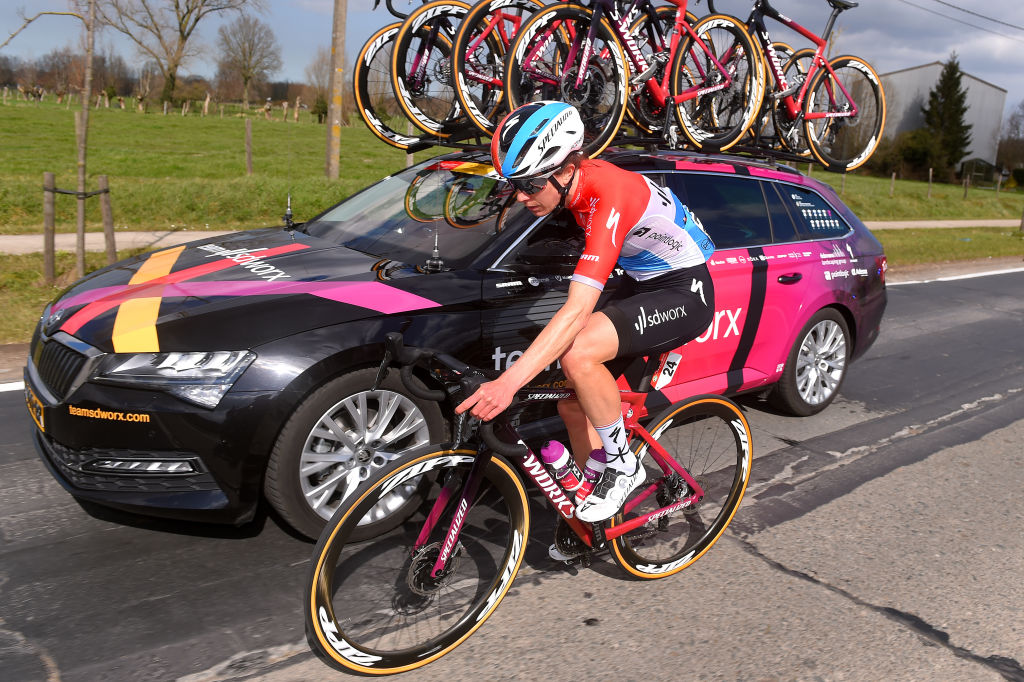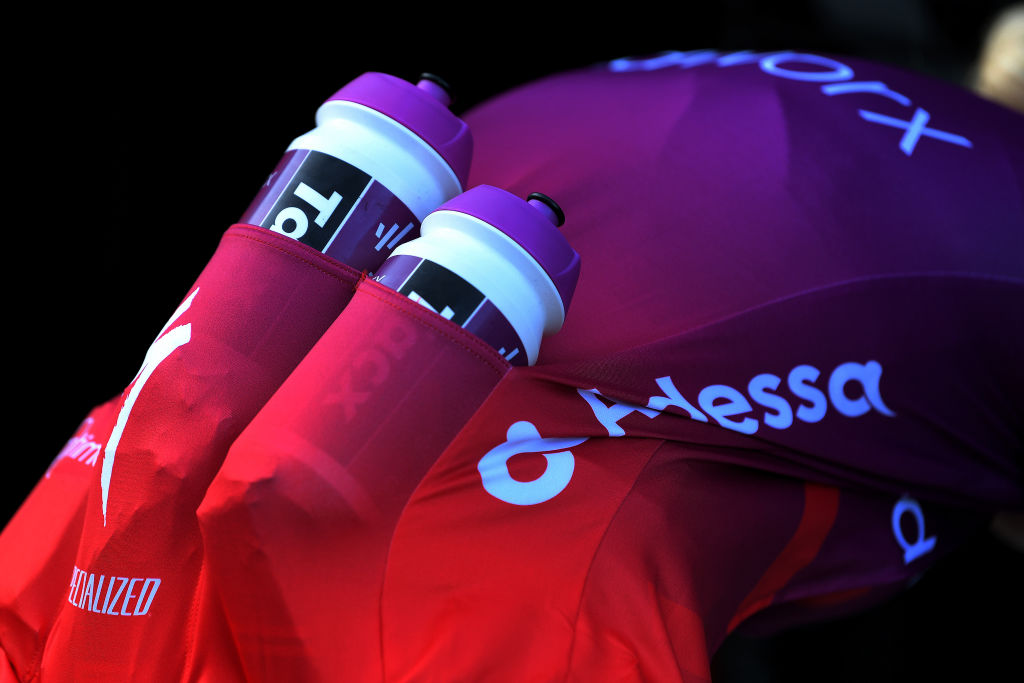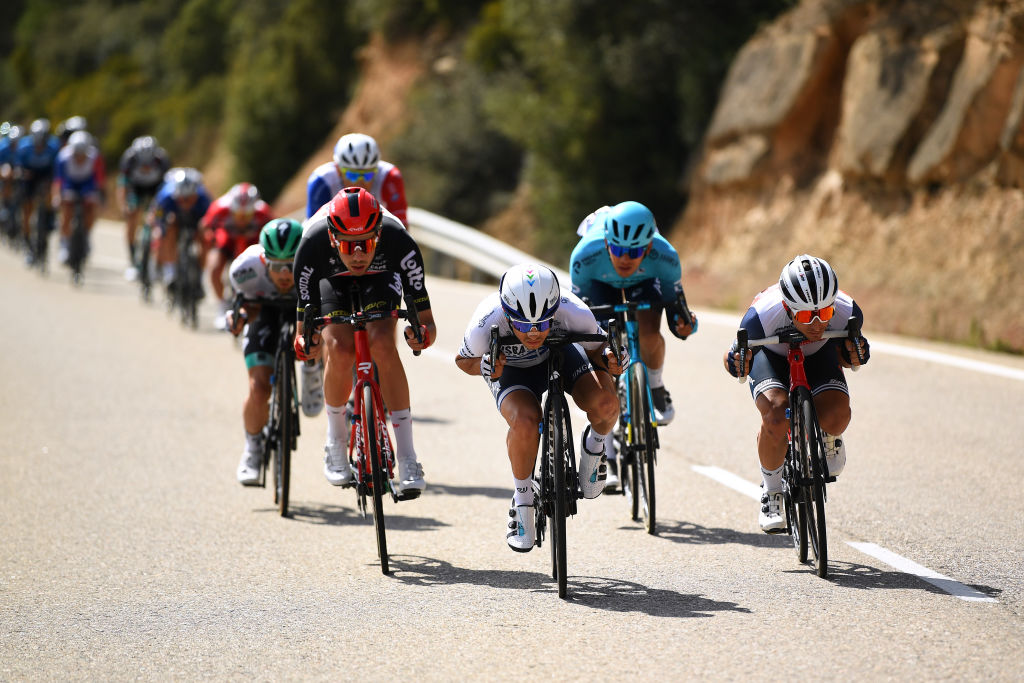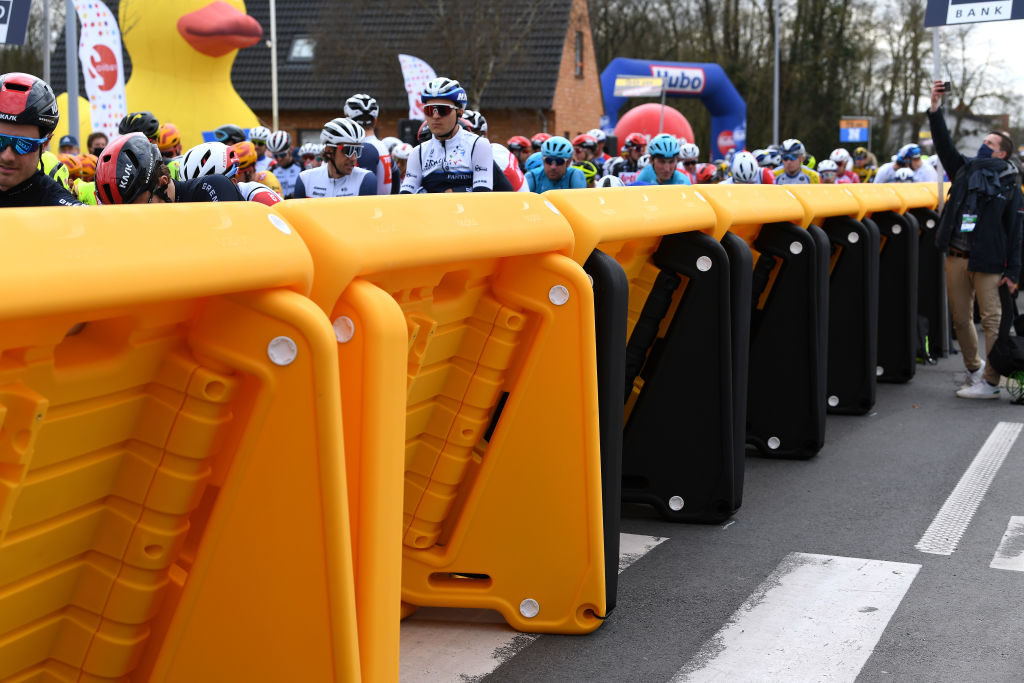Majerus: Riders accept safety rules but says there needs to be common sense
Bidon-throwing ban presents logistical nightmare, says safety committee rider representative

The UCI's newly imposed safety regulations, many of which went into effect on April 1, are already having an effect but perhaps not the improvement in rider well-being that the federation had intended. According to the UCI safety committee's women's rider representative, Christine Majerus, riders have accepted their responsibility by abiding by rules against discarding bidons outside of litter zones and non-traditional riding positions but the UCI still needs to do more to ensure race organisers do their part.
Cyclingnews first reported in February that the women's peloton was not represented on the safety working group when the decisions were made to strictly enforce rules on what positions riders can use on the bike and disqualify riders for discarding water bottles outside designated zones. Since then, Majerus joined the group and has been gathering feedback from the women's peloton to share with the UCI.
Her inclusion came after Team SD Worx teammate Ashleigh Moolman-Pasio spoke out to Cyclingnews, saying that no female riders were included on the professional rider's association (CPA) email chain regarding the proposed measures and the first they heard of the new rules was in the press. Majerus said Moolman-Pasio was approached by the CPA to join but was too busy and asked her to join instead.
Now, Majerus wants to make sure that all of the riders in the women's professional peloton know to reach out to her for any issues on safety - no matter how big or small - because it is important that their voices are heard.
Strict penalties amended for first-time offenders throwing bottles in races
Borghesi felt like a 'criminal' in disqualification for littering at Tour of Flanders
UCI to introduce barrier standards as part of road safety measures in 2021
Moolman-Pasio: Women have had no say or input regarding new safety measures
Majerus to represent women in UCI Safety Commission
"When the first new rules came out, it was quite a surprise for everyone in the women's peloton, because the guys have people in that commission ... but none of the women's riders were [at] that table. We didn't have any influence in those decisions," Majerus said. "I don't know if [men's representatives] Matteo [Trentin] and [Philippe] Gilbert really had an influence on it, but at least they were there. And they could say what they think and whatever happened after but on this day, they were sitting at the same table.
"And so it was good after that the CPA and the TCA (The Cyclists' Alliance rider's union -ed) pushed forward to also have a representative of the women's peloton at the table because we are doing the same sport, and we're taking the same risks, so we also deserve to be part of that commission."
Majerus has so far taken part in just one meeting before the rules came into force. After the Tour of Flanders - where Letizia Borghesi (Aromitalia-Basso Bikes-Vaiano) and Michael Schär (AG2R Citroën) were fined and disqualified for tossing a bidon - she surveyed her fellow riders and made a report to the working group.
Get The Leadout Newsletter
The latest race content, interviews, features, reviews and expert buying guides, direct to your inbox!
Her feedback along with that of the CPA convinced the UCI to institute a warning and fine for the first offence in discarding waste outside the litter zones, but the rules against the 'super-tuck' are still being strictly enforced, as witnessed by Richard Carapaz (Ineos Grenadiers) being disqualified at Liège-Bastogne-Liège.
"We got the adjustments with the fines set got a little bit lower but we also tried to put forward that we should still be allowed to throw the bottle to fans and that was not heard."
Battle over bidons

As summer comes and the temperatures soar, riders will also need to be getting bottles from the team cars more frequently, but for every bidon that comes from the car, one needs to either be discarded in a designated zone, carried back to the car or shoved up the back of the rider's jersey until they can get to the litter zone.
Teams can go through 100 bidons in one day of racing and Majerus said the bidon-throwing ban is going to present a logistical problem both for riders and for the race jury when it comes to catching rule-breakers.
"The main feedback from the [riders regarding] bottles was it's a logistical problem for riders, having to think 'when can I throw my bottles away?' Do I still have enough drinks? Like if I have to go and get bottles for my teammates, I should not bring more because I don't know what to do with the ones that are left you know. Most times you bring more in case you lose one, so it's logistically a little bit hard actually."
During Tour of Flanders, the bidon rule wasn't a major issue because the litter zones were well placed, but managing bidons took extra mental effort and presented another possible safety issue. "I saw girls riding with an extra bottle in their back pocket because they couldn't throw it away yet. It's not safe - if you crash with the bottle in your back pocket you might hurt your back. So it's also not safe. It's not a solution to do that."
Majerus said when it's hot that the judges might turn a blind eye to some offences but that is also a logistical problem. "Now it will depend on who does it and that's not fair. So a rule is a rule. So either you throw it away or you don't throw it away, and you get punished or you don't get punished. But once you have to start judging situations it's going to be a nightmare also for the jury."
This is where common sense comes in, and Majerus thinks throwing bottles to fans should not be punished.
"They should definitely punish when we throw things away in the middle of nowhere, but throwing bottles to fans, I think we all agree that's also part of cycling - and that's why also spectators are coming. And I don't think it's a good idea that the spectators all group around the litter zones, especially at the moment where you have to keep your distance. So I don't think that's the real solution either."
The CPA and the working group are still in discussions but Majerus was not optimistic, saying, "I'm not so in good spirits over it."
Majerus says she doesn't think the ban on bidon-tossing is doing much for safety while acknowledging that riders should be more environmentally aware and not throwing litter into green spaces.
"It's not really a safety problem," Majerus says over the bidon debate. "At some point, the bottles will be thrown away [in the litter zones] so there will still be bottles on the road. If the danger is still there, for me, that's the wrong argument. We all agree that throwing your bottle or your [wrappers] in an empty green field should be punished."
She says there's no argument that the riders need to stop littering. "We all want to help with that and we are ready to take responsibility for that. But there also needs to be a little bit of common sense. If I throw my bottle to a fan, I'm pretty sure it's gonna be picked up, and there's no littering problem."
The race organisers can't easily clean up after a peloton racing across a 200-kilometre route, so the zones make it easier for the organisation to pick up after the riders, but the positioning of the zones and the fact that fans are gathering together there during a pandemic to catch souvenirs remains a problem.
"I saw some litter zones in the men's races that were on bridges," Majerus said. "So who's going to tell me that they are also going to clean under the bridge? Probably not. It's just small details."
Super-tuck controversy swamping more important safety issues

Majerus said she felt the enforcement of rider position rules was unnecessary and the controversy around it is shifting the discourse away from more important safety issues. She feels safe riding in the so-called super-tuck, and thinks riders should be given a choice.
"I don't think it's an unsafe position, I feel comfortable in it. If you don't feel safe in it, and you don't do it. I can understand the thinking that you shouldn't show dangerous things to the public, that you have to be an example to young riders. But on the other hand, it's just high-level sport, and you need to push your body and your bike-body combination to the limits, and adopting the fastest and the most aero position is part of it.
"So I don't really understand why you should ban it - then you can also ban ski jumpers, who do triple saltos, and Formula 1 drivers who drive at 300kph. That's also not giving a good example but that's not like they are not banned for it.
"I think it's actually a non-problem, which becomes a problem now. Everyone is talking about the super-tuck, but it's not the most important thing. It's not that I've never seen any accident with it, but I've seen more accidents because the road was not good or because the cars were driving shit. I think these are more important than the super-tucking thing.
"But riders are ready to take responsibility - I don't agree with [the ban] but I accept it now and I won't do it anymore. So that's my part, but I also want to see then the UCI taking responsibility for the other rules. Like if the barriers are not good, then they should also punish the organisation.
"We already saw again barriers that were not good but I've never heard anything about the organisation being punished for it. It's easy to punish [Richard] Carapaz because he's super-tucking. But it's harder to punish, for example, Amstel Gold Race, where I got info that again barriers all along the road were not standing in a good way, and that was super dangerous.
"So, I accept being under pressure and having rules that I don't necessarily agree with it, I accept to respect them. But then I also want [the UCI] to make sure that everyone else is accepting the rules they are putting on paper. And that's until now maybe not always the case."
Some positive signs

Majerus noticed the initiatives that Flanders Classics took in their races to add new shock-absorbing plastic barriers along the finishing straights and large bollards with alarms marking traffic furniture or other dangers. They partnered with BoPlan for barriers and a Norwegian group Safe Cycling Race to add signals to the course.
"I think that was really, really impressive what they put on the road. And I think everyone was happy with it," Majerus said. "I think that's the future. I also understand that it's not possible for all organisations to have those things, because I guess it's more expensive, and it takes a bigger budget, but that's definitely something that everyone needs to try and trend toward."
She suggested that the UCI should be more diligent about punishing races that have multiple safety issues and that they could help smaller races improve their safety infrastructure.
"The UCI should definitely take responsibility and go to the organisation and say if we don't see improvement, then you don't get your licence again to organise the race. But of course, that is harder to say because then they also will not get paid by the race. There's easy punishment and hard punishment, it's easy to punish the rider because that's not costing anything but punishing the organisation is costing them something. But they also need to realise that it's a shared responsibility and [riders] are ready to take responsibilities. Flanders Classics showed that it is possible. So now they just need to find a solution to make it possible for everyone and affordable for everyone."
Majerus said that while men and women are practising the same sport and have the same safety needs, there may be more support needed for women's race organisers who, by and large, are running on much smaller budgets.
"I see a lot of organisations are making effort - [this week's Festival] Elsy Jacobs here in Luxembourg is organised by my club, so I follow a little bit the discussions and they really have been working hard on the security standards to catch up with the new rules and to really make it better. So I think the organizations realise that they have to work on it. The only problem is just to how to make it affordable and possible for everyone."

Laura Weislo has been with Cyclingnews since 2006 after making a switch from a career in science. As Managing Editor, she coordinates coverage for North American events and global news. As former elite-level road racer who dabbled in cyclo-cross and track, Laura has a passion for all three disciplines. When not working she likes to go camping and explore lesser traveled roads, paths and gravel tracks. Laura specialises in covering doping, anti-doping, UCI governance and performing data analysis.